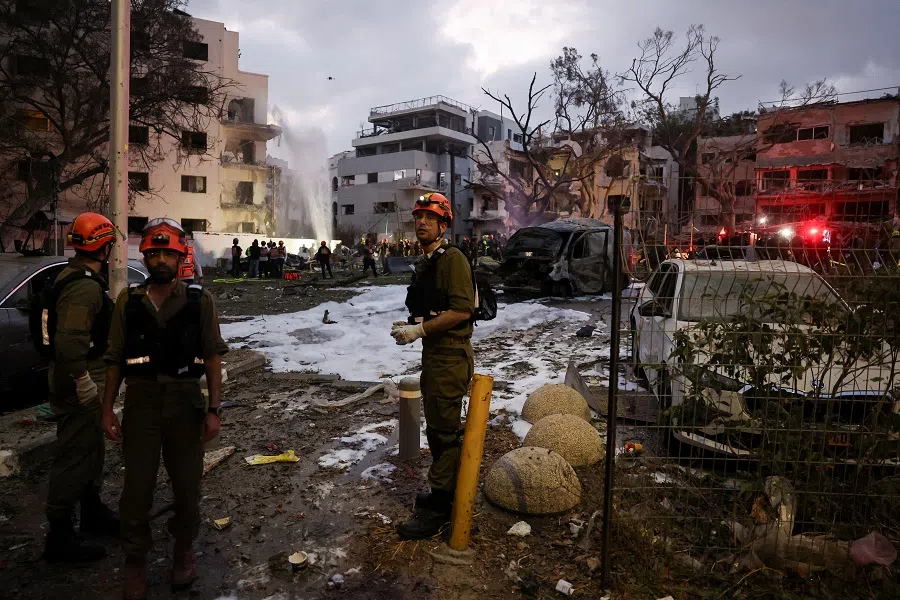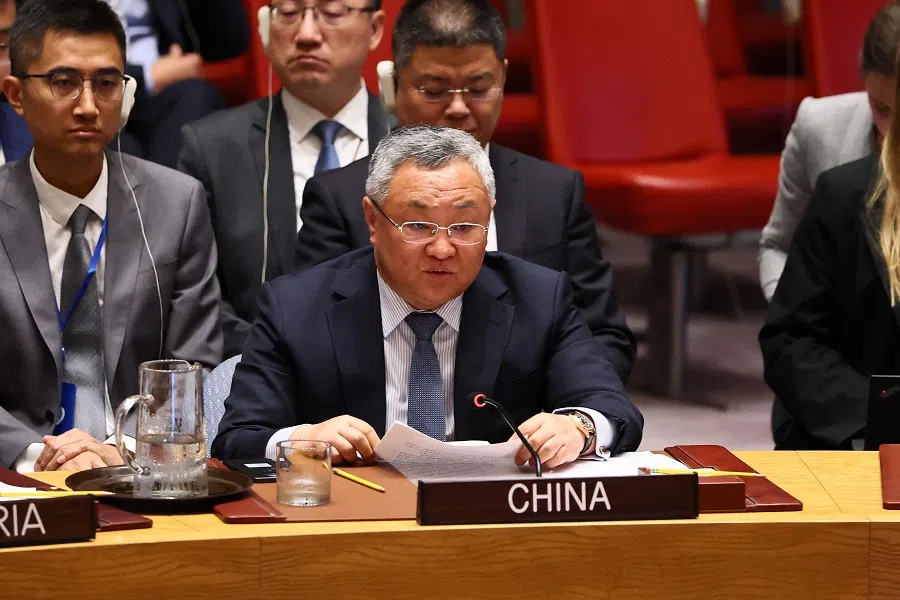As Israel strikes Iran, China’s diplomatic leverage wanes
Beijing does not have the strategic clout to tip the balance in the escalating military confrontation between Israel and Iran, says academic Alessandro Arduino. At the same time, the prospect of war in the region threatens to undermine Beijing’s efforts to position itself as a credible alternative to Western diplomacy, particularly among the global south.

As Israeli forces launched waves of airstrikes on Iran, Chinese embassies issued public safety advisories to their citizens in both countries, reflecting growing concerns in Beijing over deepening instability in the Middle East and its implications for Chinese strategic interests. In a statement posted on its official WeChat account, the Chinese embassy in Tel Aviv urged Chinese nationals to “closely monitor developments, remain calm and stay highly alert”. The embassy in Tehran issued a similar advisory, calling on Chinese citizens and businesses to bolster security precautions and avoid sensitive or crowded areas. The warnings followed a dramatic escalation in the regional conflict.
While Trump voiced opposition, his failure to outline any consequences may have signalled a green light or at least a gamble Netanyahu was willing to take.
Escalation of Israel-Iran conflict
On the 61st day of President Donald Trump’s 60-day ultimatum to Tehran to curb its nuclear enrichment activities, Israel unleashed a series of coordinated strikes targeting Iranian nuclear installations, missile sites and key military infrastructure. Israeli Prime Minister Benjamin Netanyahu seized the moment, exploiting the deadlock in nuclear talks to authorise the strike, despite President Donald Trump’s request to hold back. While Trump voiced opposition, his failure to outline any consequences may have signalled a green light or at least a gamble Netanyahu was willing to take.
The attacks to degrade Iranian nuclear capabilities were also part of a broader campaign of leadership decapitation tactics, involving targeted killings of senior military leaders and nuclear scientists, using a mix of precision-guided missiles, drones and covert ground operations.
The strikes targeted key figures in Iran’s top military and nuclear programme to disrupt command-and-control capabilities and stall the country’s uranium enrichment programme. Among those killed was the chief of staff of the armed forces, Major General Mohammad Bagheri, the highest ranking military officer in the Islamic Republic, overseeing the coordination and command of both the regular army (Artesh) and the elite Islamic Revolutionary Guard Corps (IRGC). Another was the commander-in-chief of IRGC, Major General Hossein Salami, appointed by Supreme Leader Ayatollah Ali Khamenei, and a third was Gholam Ali Rashid, the commander of Khatam al-Anbiya, Iran’s unified combat command headquarters.
The targeted elimination of Iran’s top military leaders signals that these strikes were meticulously planned well in advance and backed by real-time intelligence on the officials’ precise locations and the movements of their security details.
Tehran’s response unleashed a storm of drones and ballistic missiles over Tel Aviv, but despite the show of force, its toolbox of retaliatory options is now more limited than it has been in years.
Iran: limited toolbox of retaliatory options
The operation comes amid the stalling of US-led negotiations aimed at curbing Iran’s nuclear ambitions and follows a broader shift in regional power dynamics. The so-called “Axis of Resistance”, comprising Iran, Syria, the Hezbollah, Iraqi Popular Mobilisation Units (PMUs) aligned with Tehran and the Houthis, has suffered a series of strategic setbacks in recent years, including the erosion of Iranian influence in Syria after the fall of Assad’s regime, disrupting direct supply lines to Hezbollah in Lebanon.
Tehran’s response unleashed a storm of drones and ballistic missiles over Tel Aviv, but despite the show of force, its toolbox of retaliatory options is now more limited than it has been in years. Meanwhile, Israel has escalated its own campaign, launching airstrikes on Iranian refineries and gas facilities, a move that ramps up economic pressure and carries the potential for far-reaching disruption.

Following Israel’s attack, Chinese foreign ministry spokesman Lin Jian said that China was “deeply concerned about the potential grave consequences of the operations” and that “China opposes actions that violate Iran’s sovereignty, security and territorial integrity, and opposes moves that escalate tensions and enlarge conflicts“. He added that China was willing to “play a constructive role in helping ease the situation”. Meanwhile, China’s UN ambassador Fu Cong said that China has always been committed to peacefully resolving the Iranian nuclear issue through dialogue and negotiation, and that China opposes the use of force and illegal unilateral sanctions, and armed attacks on peaceful nuclear facilities.
When rights are dictated by the barrel of a gun, even essential economic diplomacy finds little room to operate.
China’s rhetoric outruled by hard power
But for Chinese diplomats, the current crisis presents a stark challenge. Beijing finds its influence at the lowest point in Israeli public opinion since the October 7 attacks in 2023. At the same time, Iranians are voicing their frustration online, asking why China has not stepped up in the aftermath of the strikes.
Beijing has long advocated a development-centred approach to Middle East stability, maintaining that the region’s turmoil stems from economic stagnation and underdevelopment. Yet such rhetoric offers limited traction in a geopolitical environment increasingly shaped by hard power. When rights are dictated by the barrel of a gun, even essential economic diplomacy finds little room to operate.
Despite China’s economic footprint in the Middle East, rising alignment with the wealthy Gulf monarchies, strategic partnerships under the Belt and Road Initiative (BRI), and the region’s inclusion in multilateral organisations such as BRICS and the SCO, its political and diplomatic influence is getting diluted.

The Iranian President Masoud Pezeshkian had been planning a visit to Beijing to advance bilateral ties under the two countries’ strategic cooperation agreement, but the Israeli strikes are likely to put those plans on hold, at least for now. While Chinese ambassador to Tehran Cong Peiwu continues to press for closer coordination with Iran, Beijing simply does not possess the strategic clout to tip the balance in the escalating military confrontation. Meanwhile, China’s new ambassador to Israel, Xiao Junzheng, is watching his efforts to mend strained relations growing more difficult by the day, as rising geopolitical tensions cast a long shadow over Beijing’s push for deeper economic ties, particularly in technology investment and trade.
... the prospect of war in the region threatens to undermine Beijing’s efforts to position itself as a credible alternative to Western diplomacy, particularly among the global south.
The stakes for China are significant as a prolonged conflict between Iran and Israel could trigger oil price shocks, jeopardise China’s energy security, particularly imports from Iran and Iraq, and further destabilise the fragile network of trade and infrastructure projects central to the BRI. Moreover, the prospect of war in the region threatens to undermine Beijing’s efforts to position itself as a credible alternative to Western diplomacy, particularly among the global south.
Years ago, Israeli investigative journalist Ronen Bergman warned in his book Rise and Kill First that while Israel’s assassination campaign brought tactical victories, it came at a steep diplomatic cost. For China, that cost may now include a reduced capacity to shape or even meaningfully respond to the volatile realities of a region once viewed as a pillar of BRI’s global reach.



![[Big read] When the Arctic opens, what happens to Singapore?](https://cassette.sphdigital.com.sg/image/thinkchina/da65edebca34645c711c55e83e9877109b3c53847ebb1305573974651df1d13a)
![[Video] George Yeo: America’s deep pain — and why China won’t colonise](https://cassette.sphdigital.com.sg/image/thinkchina/15083e45d96c12390bdea6af2daf19fd9fcd875aa44a0f92796f34e3dad561cc)
